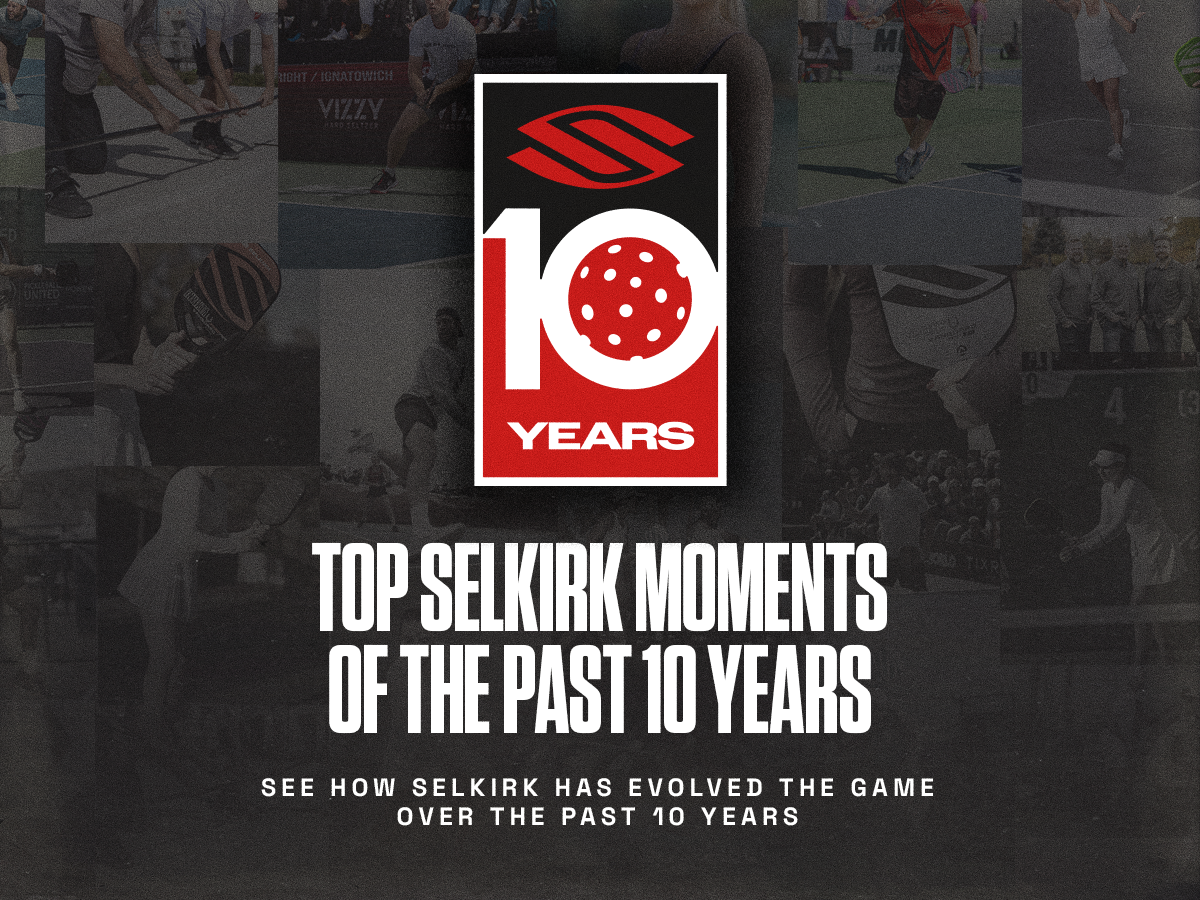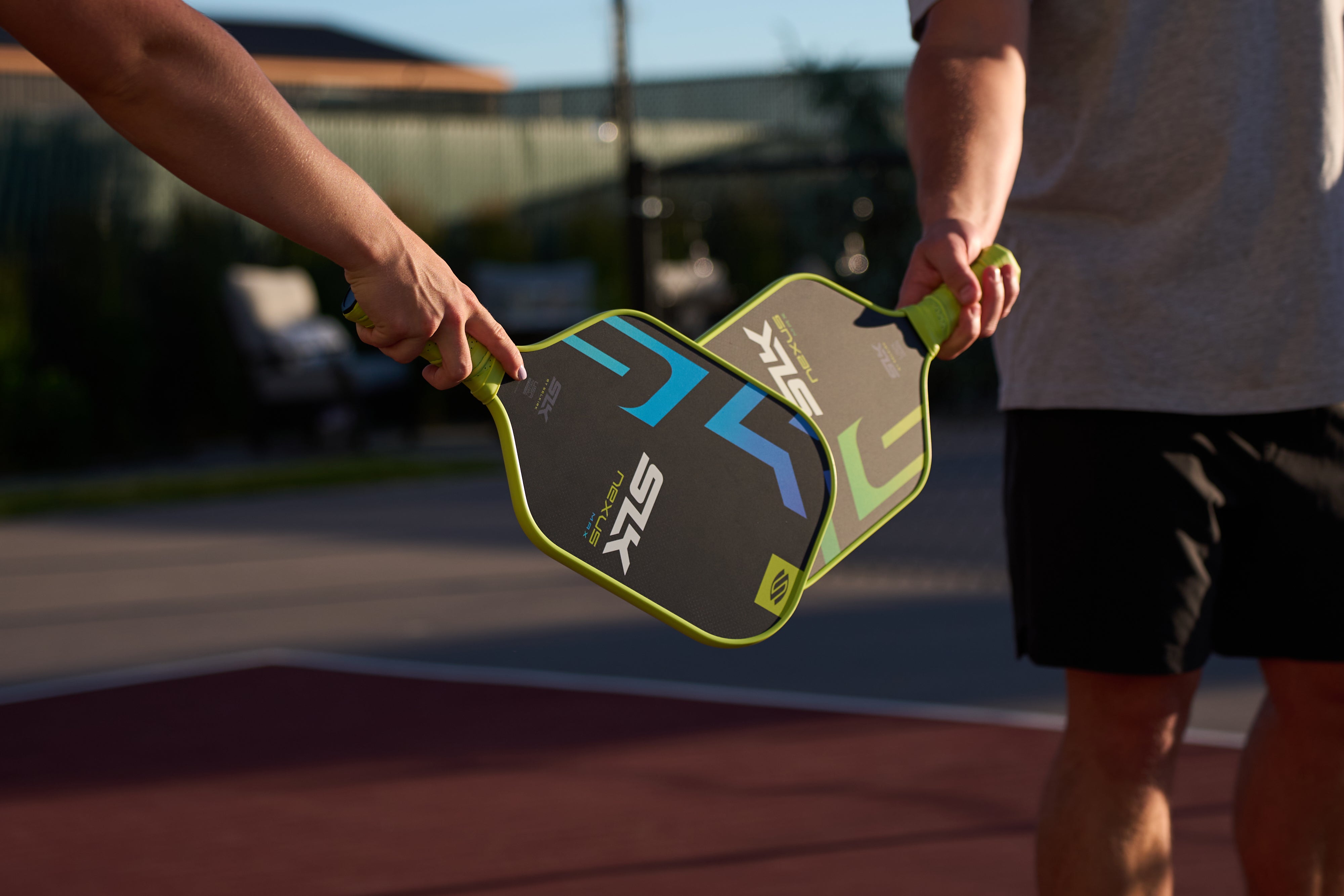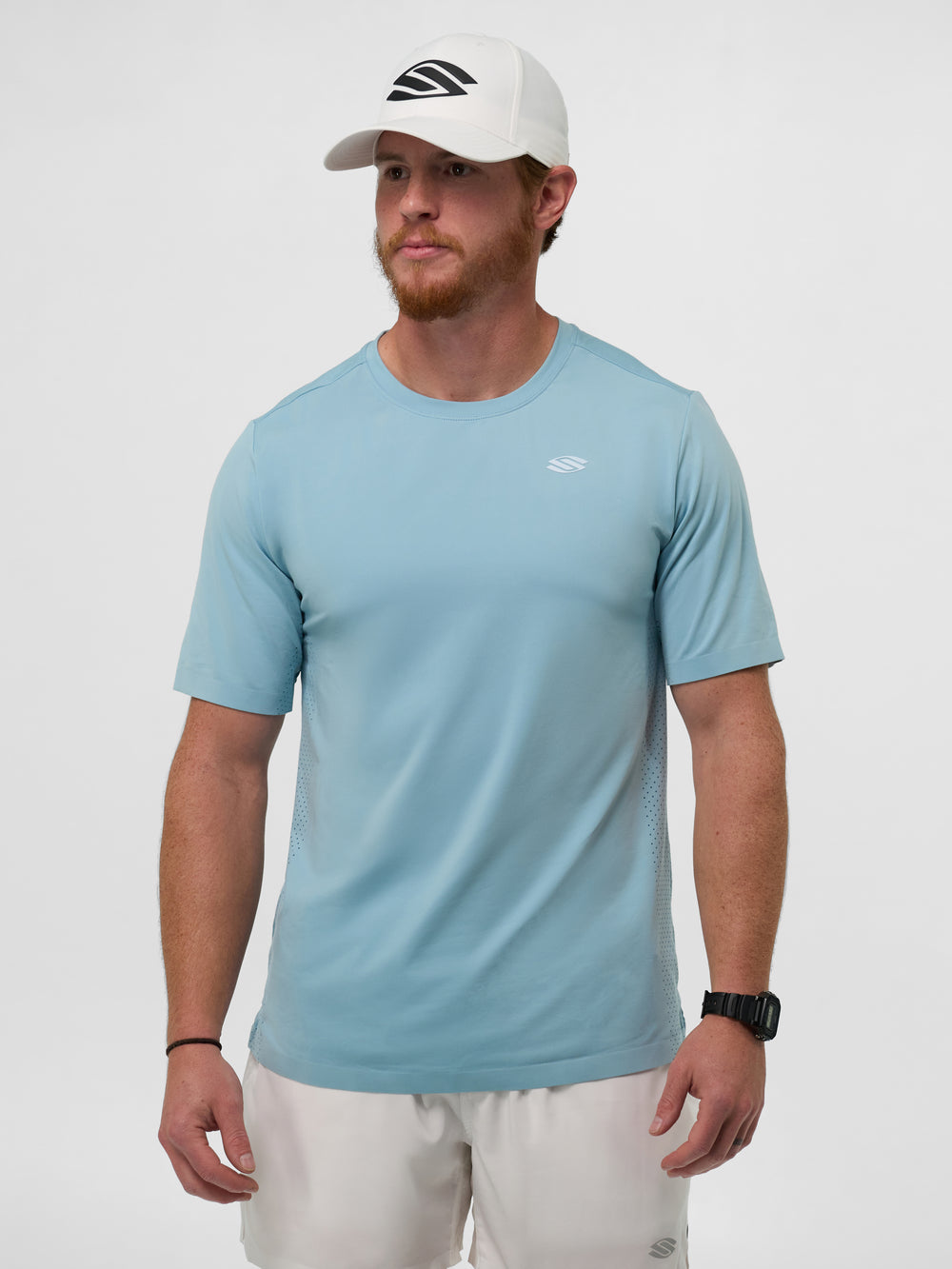A
Ace: [noun, verb] Any serve not returned by the receiver.
- Noun example: He hit an ace.
- Verb example: He aced the receiver.
Around-the-post: [noun] Also referred to as an ATP, opens in a new tab, a legal shot that travels around the net posts.
Association of Pickleball Players: [noun] Also referred to as the APP, opens in a new tab, a professional pickleball tour sanctioned by USA Pickleball, opens in a new tab.
B
Backcourt: [noun] The area of the court located near the baseline.
Backdraw: [noun] The pool of players in a double-elimination tournament who have lost one match but are still in contention for a medal.
Backhand: [noun, verb] The reverse side of the paddle; the non-dominant side of the paddle.
- Noun example: He used a backhand shot.
- Verb example: He backhanded the pickleball.
Backspin: [noun] When the ball is hit so hard it spins backward. When the ball leaves your paddle, the rotation is spinning toward you. Also known as a slice shot.
Backswing: [noun] The backward movement of the pickleball paddle in advance of striking the ball.
Bagel: [noun, verb] A slang term for a shutout game where one team scored no points. An 11-0 ending score. Also known as “getting pickled.”
- Noun example: We scored a bagel.
- Verb example: We bageled the other team.
Bainbridge Island: [noun] An island in the state of Washington, opens in a new tab where pickleball was invented.
Ball on [noun]: A call made to alert all players that an errant ball has made its way to their court. For safety, all players should stop playing immediately and restart the point once the errant ball is cleared.
Band or banded player: [noun] In tournament play, the starting server is often asked to wear an indicator band (often a silicon wrist band) so the referee can keep track.
Banger: [noun] A term used to describe players who prefer to hit the ball hard.
Baseline: [noun] The line that denotes the back edge of the court. The baseline runs parallel to the net and is 22 feet from the net.
Bert: [noun] In doubles, a poach shot where a player crosses in front of their partner to execute an erne on their partner’s side of the court.
Block shot: [noun] A defensive shot with little to no backswing intended to slow down the ball.
Body bag: [noun, verb] A slang term for hitting a ball into your opponent’s body.
- Noun example: He hit his opponent with a body bag.
- Verb example: He body bagged his opponent.
Body shot: [noun] A shot that hits the body of an opposing player and wins a point.
C
Carry: [noun, verb] Hitting the ball in such a way so that it doesn’t immediately bounce off the paddle, but gets carried along the paddle face.
- Noun example: He hit a carry, which resulted in a fault.
- Verb example: He carried the ball.
Centerline: [noun] The line bisecting the service courts. It extends from the non-volley line to the baseline.
Chainsaw: [noun] A serve that starts by swiping, brushing, or rolling the ball against the paddle before tossing the ball. This extra motion imparts spin on the ball. The serve was popularized by pro Zane Navratil and was banned by the USAP in 2021.
Challenge court: [noun] During social play, a challenge court is where the winner of a match stays to take on the next challenger.
Chicken wing: [noun, verb] An awkward defensive shot made with the paddle arm bent and elbow extends up and away from the body. It also refers to the shoulder and armpit area on an opponent, because when you hit that spot, it makes your opponent hit a chicken wing shot.
- Noun example: He hit a chicken wing over the net.
- Verb example: He chicken-winged his opponent.
Chip shot: [noun] Striking the ball using an open-faced paddle while moving the paddle downward to impart backspin on the ball.
Closed face: [noun] Tilting the paddle face down when striking the ball.
Continental grip: [noun] A way to grip the paddle, opens in a new tab in which a player holds the paddle handle so that the index finger and thumb form a V shape on the edge of the paddle.
Crosscourt: [noun] The opponent’s half of the court that is diagonally opposite of the player striking the ball.
D
Dead ball: [noun] A ball that is no longer in play. A dead ball occurs when a fault is committed, the ball strikes a permanent object, or a hindrance is called.
Default: [noun] To give an opponent a win by absence or by choice.
Deflecting net: [noun] Added to the USA Pickleball rules in 2024, a net that has abnormally changed shape at the time of contact with the ball, such as a net moving in the wind.
Dink: [noun, verb] A soft return shot made at or in the non-volley zone after the ball has bounced. A dink typically drops into the opponent’s non-volley zone.
- Noun example: He hit a dink shot.
- Verb example: He dinked the ball.
Dink volley: [noun] A soft return shot made at or near the non-volley zone prior to the ball bouncing. The dink volley should land into the opponent’s non-volley zone.
Dinker: [noun] A player that is known for their dinking prowess.
Distraction: [noun] A pickleball distraction is something that affects the ability to play the game that is caused by another player.
Double hit: [noun] Hitting the ball twice in succession before the ball is returned. Double hits are allowed, provided they are performed as one continuous stroke. If the ball is hit twice outside of a continuous stroke, a fault is called.
Doubles: [noun] Pickleball matches that have two players per side. Mixed doubles is played with a male and female on each side. Gender doubles is two teams of males or two teams of females facing off.
Drive shot: [noun, verb] A powerful groundstroke or volley hit quickly to the opponent’s side of the court.
- Noun example: He hit a drive shot to his opponent’s backhand.
- Verb example: He drove the ball.
Drop serve: [noun, verb] A serve that a player makes by dropping the ball and letting it bounce before executing the serve rather than hitting the ball out of the air.
- Noun example: He hit a drop serve.
- Verb example: He drop serves the ball.
Drop or drop shot: [noun] A soft return shot made from backcourt or the transition zone after the ball has bounced that lands in the opponent’s non-volley zone.
Drop volley: [noun] A soft return shot made from backcourt or the transition zone prior to the ball bouncing that lands in the opponent’s non-volley zone.
DUPR: [noun] “Dynamic Universal Pickleball Ratings” created by MLP founder Steve Kuhn. DUPR, opens in a new tab is a player rating system that allows players to more fairly enter tournaments.
E
Eastern grip: [noun] A type of pickleball grip, opens in a new tab resulting in a slightly closed face for forehands and a slightly open face for backhands.
Edge guard: [noun] A thin trim around the edge of a pickleball paddle to protect it from scrapes.
Erne: [noun, verb] A volley hit near the net by a player positioned outside the court, or a player in the process of leaping outside the court. The shot is named for Erne Perry, the first person credited with using the shot in mainstream play.
- Noun example: He hit his opponent with the Erne, opens in a new tab.
- Verb example: He Ernied the pickleball.
F
Fault: [noun] An infringement of the rules that ends a point.
First server: [noun] In doubles play, the first team member to serve the ball after a side-out.
Flat face: [noun] A flat face occurs when a player holds the paddle face parallel to the plane of the net when striking the ball.
Follow through: [noun] The continual swing of your arms after it has made contact with the ball.
Foot fault: [noun] A foot fault is when a player places their foot over a line when they are not allowed. It can occur when serving or volleying and results in a loss of point. When serving, a foot fault can occur when the server fails to keep both feet behind the baseline, with at least one foot in contact with the ground as the paddle hits the ball. When volleying, a foot fault occurs when a player steps into the non-volley zone, which includes any line around the non-volley zone while striking the ball or when completing the motion after volleying.
Forehand: [noun] A shot made when hitting the ball on the same side of your body as your dominant hand.
G
Golden ticket: [noun] An automatic qualification to enter the National Championships that is granted to players who win a gold medal at a qualifying event.
Grip: [noun] Pickleball grip, opens in a new tab may refer to either the manner in which a player holds a pickleball paddle or the material that covers the handle of a pickleball paddle.
Groundstroke: [noun] A ball that is struck after it bounces.
H
Hindrance or Hinder: [noun] An interference of play by something outside the game. Common hindrances include an errant ball, a person from another team crossing onto your court, or inappropriate crowd noise. Hindrances result in a dead ball and the point is replayed.
I
In: [noun] A line call made when a ball lands inside the court.
Incorrect position: [noun] A call made when the ball is served from the wrong serving area.
Incorrect receiver: [noun] In doubles, a call made when the wrong receiving team member returns the serve.
Incorrect server: [noun] In doubles, a call made when the wrong team member serves the ball.
Inside-out: [noun] A shot where a player pretends they are going to hit the ball to the middle of the court, but at the last instant, sends the ball to the sideline.
International Federation of Pickleball: [noun] A federation of national pickleball organizations. Also known as IFP.
J
K
Kitchen: [noun] Another name for the non-volley zone.
Kitchen line: [noun] A nickname for the line parallel to the net that separates the non-volley zone from the rest of the court. Also known as the non-volley line.
L
Let serve: [noun] A served ball that hits the net, but still lands in the correct service court. The serve is considered valid by the USAP rulebook.
Line call: [noun] The official determination of whether a ball has landed inside or outside the courtlines. In non-refereed matches, players are responsible for making their line calls. If there is uncertainty, the line call should be made in favor of the opponent.
Lob shot: [noun, verb] A shot in which the ball is hit in a high arc over an opponent’s head so that it lands in the opponent’s backcourt.
- Noun example: He hit a lob shot.
- Verb example: He lobbed the ball.
M
Major League Pickleball: [noun] A form of professional pickleball in which players compete on teams of four. Each team consists of two men and two women and teams face off in men’s doubles, women’s doubles, and two rounds of mixed doubles. Also known as MLP.
Majors: [noun] The three premier professional tournaments in pickleball. The tournaments include the U.S. Open, USA Pickleball Nationals, and the Tournament of Champions.
Midcourt: [noun] The area of the court between the non-volley zone and backcourt. Also known as the transition zone.
Misdirection: [noun] A strategy in which a player intentionally deceives their opponent by preparing to hit the ball in one direction or with a certain pace, but then changing course to hit it in an unexpected manner.
Momentum: [noun] Literally, momentum is the notion that a body in motion continues its motion and direction. In pickleball, if a player’s momentum causes them to step in the non-volley zone after volleying the ball, that is considered a fault. All action that happens after the player volleyed the ball is considered void. So, if a player volleys the ball, scores a point, and then their momentum continues them into the kitchen, it is still a fault.
N
Nasty Nelson: [noun] Named for Timothy Nelson, a Nasty Nelson, opens in a new tab is a serve that intentionally hits the non-receiving player who is typically standing closest to the net. If the ball hits the non-receiving player, the serving team receives a point.
No man’s land: [noun] The area of the court midway between the baseline and the non-volley zone. It is considered a vulnerable location for a player to be standing. Also known as the transition zone.
Non-volley line: [noun] Court lines that are parallel to the net and 7 feet back from that. The non-volley line and the sidelines on either side of the non-volley line make up the non-volley zone.
Non-volley zone: [noun] A 7-foot by 20-foot lined area closest to the net. One may not volley the ball while standing in the non-volley zone, including all the lines of the zone. A player may stand in the non-volley zone, and complete dinks within the non-volley zone, but most reestablish both feet outside the zone before hitting a volley shot. Also known as the kitchen or NVZ.
O
Open face: [noun] A paddle that is titled upward when striking the ball with the lower edge of the pickleball paddle.
Open play: [noun] Community games where players of any skill level are welcome to play.
Out: [noun] A line call made when a ball lands outside the court lines. Typically signaled with the pointer finger pointed upward.
Overgrip: [noun] Material that is wrapped around the handle of a paddle to improve its grip.
P
Pace: [noun] The speed and power a ball has after it has been struck by a paddle. Players use pace to control the rhythm of the game.
Passing shot: [noun] A low shot that passes outside the reach of an opponent and lands inbounds.
Permanent object: [noun] Any object near or above the court, including but not limited to, net posts, fencing, officials, spectators, or the ceiling. If a ball hits a permanent object after being struck by a player but before landing on an opponent’s side of the court, a fault is called on the last person to strike the ball. If the ball bounces on the opponent’s side and then hits a permanent object, a fault is called on the opponent.
Pickleball: [noun] The greatest sport in the world.
Pickled: [noun] To lose a game 11-0. Also known as bagel.
Pickler: [noun] A person obsessed with pickleball.
Poach: [verb] In doubles, when a player crosses to their partner’s side of the court to steal a shot that would normally be their partner’s responsibility.
Pop-up vs pop up: [noun, verb] Pop-up is a noun and should be used to refer to a ball that is hit high enough to be easily attacked by an opponent. Pop up is a verb and should be used to refer to the action of popping the ball up.
- Noun example: He hit a pop-up.
- Verb example: He popped up the ball.
Professional Pickleball Association: [noun] A professional pickleball tour. Also known as the PPA Tour, opens in a new tab.
Punch volley: [noun] A quick volley shot made with little or no backswing.
Push-off or push-off fault: [noun] When a player leaps for a ball, typically a lob, but their foot was touching the non-volley zone when they jumped.
Put-away: [noun] A shot with such pace that your opponent cannot return it.
Q
R
Rally: [noun] Continuous play that starts with a serve and ends with a fault, point scored, or loss of point.
Rally scoring: [noun] A type of scoring in which a point is awarded at the end of each rally, no matter who is serving.
Receiver: [noun] The player returning the serve. The receiver should be diagonally opposite the server.
Replay: [noun] A point that is played over, typically due to a hindrance or interference.
Retirement: [noun] When a player or team decides to no longer continue a match.
Round robin: [noun] A tournament format where all players or teams play games against all other players or teams to determine the winner.
S
Score: [noun] The current point total of the game which must be announced prior to each serve. Each server should announce the score with their team’s points first, followed by the either team’s points, followed by which server they are. So, if a person is the second server, their team as 4 points, their opponents have 6 points, they would say 4-6-2.
Scorpion: [noun] An overhead shot a player makes while in a squatted position.
Second server: [noun] In doubles, the person the serve passes to when the serving team loses its first point.
Selkirk Pickleball TV: [noun] The best pickleball media app, opens in a new tab out there.
Semi-western grip: [noun] A type of grip that results in a closed face for forehands and open face for backhands. This grip is for players who favor their backhand.
Service court or service area: [noun] The area of the court that a valid serve must land in. The serve court is the larger box opposite from the server. Serves that land on all lines are considered in, except the non-volley line.
Service return: [noun] The first ball returned over the net after a serve.
Serving area: [noun] The area behind the baseline and between the imaginary extended sideline and middle line in which a person can make a valid serve.
Shading: [verb] Shifting on the court as a team toward the side of the court with the ball to better cover the sideline and center court as a team.
Shake and bake: [noun] A popular doubles strategy used by a serving team. Rather than performing a third shot drop, a player drives the ball over the net while their partner rushes to the net near the center of the court. If the opponent makes a pop-up, the player near the center of the court can perform a put-away.
Side-out: [noun] A side-out occurs after one team has lost two points. Their opponents then get a chance to serve the ball.
Side-out scoring: [noun] Side-out scoring is the traditional pickleball scoring method in which a team can only win a point while serving. Both team members get a chance to serve. Once the team has lost a point while each team member is serving, a side-out occurs. Sidelines: [noun] The lines perpendicular to the net on each side of the court.
Singles: [noun] A type of pickleball match in which one player faces off against one other player.
Skinny singles: [noun] Playing a game of singles using only the right or left side of the court. Learn the full rules of pickleball skinny singles, opens in a new tab.
Slice: [noun, verb] A shot that is hit so the ball spins backward. When the ball leaves your paddle, the rotation is spinning toward you. Also known as backspin.
- Noun example: He has a good slice.
- Verb example: He sliced the ball.
Smash or overhead smash: [noun, verb] A powerful shot one makes when the ball is above their head.
- Noun example: He hit an overhead smash.
- Verb example: He smashed the ball.
Speed-up and speed up: [noun, verb] Speed-up is a noun and should be used to refer to a pickleball shot. Speed up is a verb and should be used to refer to the act of speeding up the pickleball.
- Noun example: He hit a speed-up.
- Verb example: He will speed up the ball on his fourth shot.
Spin: [noun] Any rotation imparted on the ball by the strike of the paddle.
Split step: [noun] Standing with both feet approximately shoulder width apart and pointing toward the net. A split step should be performed right before your opponent hits the ball so you can easily decide where to move next.
Stacking: [verb] In doubles, when teammates prefer to play on certain sides of the court, they will stack on one side of the court during service so they can move to their preferred court positions after service.
T
Technical or technical foul: [noun] A foul called by a referee when a player is abusive or otherwise not following the rules. A technical adds a point to an opponent’s score. Two technicals on one player or team result in a loss of the match.
Third shot: [noun] As the name suggests, it’s the third shot of the game after the first receiving team returns the ball. Teams often use strategy to determine whether they want the point to play fast or slow and hit a third shot that reflects their strategy (either a drive or a drop).
Third shot drop: [noun] A strategy used by the serving team to place their third shot in their opponent’s non-volley zone, allowing them to advance to the net.
Timeout: [noun]: A suspension of play in an athletic game.
Topspin: [noun] Spin applied to the ball by hitting it while the paddle is moving from low to high. Topspin typically allows the ball to stay low once it contacts the ground.
Triple Crown: [noun] Winning gold in singles, doubles, and mixed doubles at a single tournament.
Tweener: [noun] A shot made when a player hits the ball between their own legs.
Two-bounce rule: [noun] A rule that requires the receiving team and the serving team to allow the ball to bounce once on their side at the beginning of every rally, opens in a new tab before either team is allowed to volley the ball.
U
Unforced error: [noun] A mistake made on a shot that is not considered difficult to execute.
USA Pickleball: [noun] The United States’ governing body of pickleball. Also known as USAP, opens in a new tab.
V
Verbal warning: [noun] A warning issued by a referee to address issues such as profanity or delaying the game. If the behavior continues, a penalty may be assessed.
Volley: [noun] A shot performed when the ball is hit before it touches the ground
Volley serve: [noun] One of two legal serves in which a player drops the pickleball and hits it before it bounces.
W
Warm-up/warm up: [noun/verb] Prepare for physical exertion or a performance by exercising or practicing gently beforehand.
Western grip: [noun] A grip resulting in a closed face for forehands and an open face for backhands. It is preferred by people with a strong backhand.
Winner: [noun] A successful pickleball shot that results in a point.
World Pickleball Day: [noun] Established by the World Pickleball Federation in 2020, the World Pickleball Day, opens in a new tab holiday is celebrated on October 10.
World Pickleball Federation: [noun] A federation of national pickleball organizations founded in 2018. Also known as WPF, opens in a new tab.
X
Y
Yips: [noun] A mental state in which a player loses routine muscle memory and consistently fails to make shots.
























































